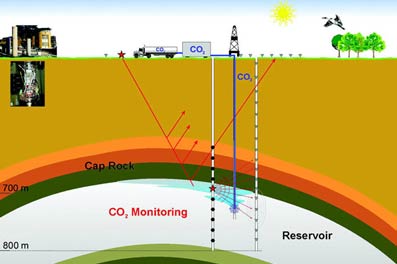For the first time Germany stores CO2 into the ground
Last Monday, CO 2 was first pumped into a gas storage site at Ketzin near Potsdam (Germany). This storage can be a pioneer for the future giant storage.
Refining and storing CO 2 from industrial emissions is considered a key technology for climate protection. Researchers want to test a variety of methods to monitor and find the most appropriate method for large storage areas.
So far, the world has very little experience in long-term and safe storage of large quantities of CO2 in the ground. With the new project, the German Geological Research Center (GFZ) in Potsdam and industry partners hope to fill this gap. "We want to keep track of the amount of the entire archive and the processes that take place in it," said Frank Schilling, project leader.
To achieve this goal, engineers drilled 3 800 m deep holes. CO2 is pumped through one of the drill holes into the porous sandstone layer. The remaining two drill lines are for measuring only. According to Schilling, the way to combine this drill is currently unique in the world. "Through it, you can see exactly how carbon dioxide spreads over time and space , " he said.
Many special sensors will reveal to researchers of the institute the temperature fluctuation, whether the insulation in rock layers containing CO 2 changes or what chemical reactions will occur between the gas CO 2 and minerals at different depths. Within the next two years, project executives hope to know exactly which measurement methods will provide the most reliable storage status.

Project diagram.The engineers drilled three 800 m deep holes.CO2 gas is pumped through one of the drill holes into the porous sandstone layer.(Photo: GFZ)
Intended to store 60,000 tons of CO 2
60,000 tons of CO2 will be stored at Ketzin. If compared to the amount of CO2 emitted by industry every year, the storage used for this research is very modest. Because of the magnitude of the difference between the experimental sites such as Ketzin and the large-scale storage sites, many experts are skeptical that not understanding the knowledge gathered here can be applied to storage places. big or not.
Many environmental protection organizations, such as Greenpeace, warn of the danger of carbon dioxide storage, such as when the stored CO2 escapes. Because CO 2 is heavier than air, it can accumulate in low-lying areas or in closed buildings and in rare cases can cause death. They demanded "avoid emitting CO 2 instead of burying it".
However, Mr. Schilling stated that the project at Ketzin is very safe: A layer of sedimentary rock above the porous stone prevents CO 2 from escaping. 3 boreholes are sealed with special cement.
The project has cost over 20 million euros, 80% is from EU sources and the German national budget, the rest is from private industrial corporations.
- 4 the opposite in Germany but few people know
- The fashion shop's tricks make you
- Friendly store
- 16 weird facts about Germany
- Design your own watches over the Internet
- November 9, 1989 - The Berlin Wall collapsed, Germany united
- Discover the earliest carnivorous fish, live with dinosaurs
- Germany: Detects an 35,000-year-old ivory mammoth
- When did people come from the tree to the ground?
- Interesting facts in Germany
- Germany: Detecting ancient battlefields with 100 bodies
- Amazingly the ground suddenly cracked in Mexico
 Is the magnetic North Pole shift dangerous to humanity?
Is the magnetic North Pole shift dangerous to humanity? Washington legalizes the recycling of human bodies into fertilizer
Washington legalizes the recycling of human bodies into fertilizer Lightning stone - the mysterious guest
Lightning stone - the mysterious guest Stunned by the mysterious sunset, strange appearance
Stunned by the mysterious sunset, strange appearance